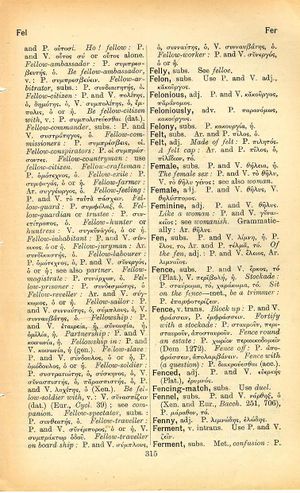feminine: Difference between revisions
From LSJ
Χρὴ τῶν ἀγαθῶν διακναιομένων πενθεῖν ὅστις χρηστὸς ἀπ' ἀρχῆς νενόμισται → When a good man is hurt, all who would be called good must suffer with him
m (Text replacement - "}}]]" to "}}]]") |
m (Text replacement - "(|thumb)\n(\|link=)" to "$1$2") |
||
| Line 1: | Line 1: | ||
{{Woodhouse1 | {{Woodhouse1 | ||
|Text=[[File:woodhouse_315.jpg|thumb | |Text=[[File:woodhouse_315.jpg|thumb|link={{filepath:woodhouse_315.jpg}}]]'''adj.''' | ||
|link={{filepath:woodhouse_315.jpg}}]]'''adj.''' | |||
P. and V. [[θῆλυς]]. | P. and V. [[θῆλυς]]. | ||
<b class="b2">Like a woman</b>: P. and V. [[γυναικεῖος]]; see [[womanish]]. | <b class="b2">Like a woman</b>: P. and V. [[γυναικεῖος]]; see [[womanish]]. | ||
Revision as of 17:14, 18 May 2020
English > Greek (Woodhouse)
adj.
P. and V. θῆλυς. Like a woman: P. and V. γυναικεῖος; see womanish. Grammatically: Ar. θῆλυς.
Latin > English (Lewis & Short)
fēmĭnīne: adv., v. femininus.
Latin > French (Gaffiot 2016)
fēmĭnīnē, au genre féminin [t. de gramm.] : Arn. 1, 59.
Latin > German (Georges)
fēminīnē, Adv. (femininus), weiblich, als gramm. t. t., Ggstz. masculine, Arnob. 1, 59. p. 41, 15 R. Fest. 250 (b), 15. Charis. 72, 30.

